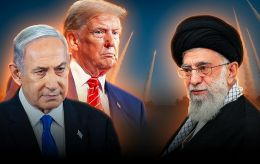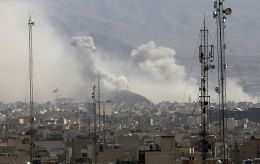What is known about Hezbollah leader Nasrallah, and whether he survived strike
 Hassan Nasrallah, the leader of Hezbollah (photo: x.com/SH_NasrallahEng)
Hassan Nasrallah, the leader of Hezbollah (photo: x.com/SH_NasrallahEng)
Today, on September 27, Israeli forces launched a strike on Beirut, the capital of Lebanon. The target of the attack was Hezbollah leader Hassan Nasrallah, who has led the militant group for over 30 years.
Contents
Israel's attack
On the evening of September 27, explosions were reported in Beirut. Local media shared photos and videos on social networks showing thick smoke rising over one of the city's districts.
Lebanese journalists further clarified that Israel conducted an airstrike on the capital. Following this, IDF spokesperson Rear Admiral Daniel Hagari confirmed that Israeli forces struck Beirut, stating that the attack targeted the main Hezbollah headquarters in the Dahieh area, a stronghold of the militants in the city.
This airstrike on Beirut marks only the third since the onset of the war last autumn. Such strikes have routinely resulted in the elimination of high-ranking Hamas and Hezbollah commanders.
A few hours after the bombing of Beirut, CNN reported, citing an unnamed Israeli official, that Israel aimed to eliminate Hezbollah leader Hassan Nasrallah during the operation.
The source confirmed that Israeli forces are trying to ascertain whether they achieved their objective.
As of now, media rumors regarding Hassan Nasrallah's status are conflicting.
Specifically, the Iranian agency Tasnim News reports that Nasrallah is alive following the Israeli attack. AFP, citing a source close to the militants, also asserts that Nasrallah is fine.
Meanwhile, Israeli Channel 13 reports that the strike on Nasrallah was successful.
An unnamed Israeli official told The Times of Israel that it is very difficult to imagine Nasrallah surviving such a strike.
There is currently no official information regarding Nasrallah's status, and Israel has yet to confirm that they attempted to eliminate the Hezbollah leader during the attack.
What is known about Nasrallah
Hassan Nasrallah was born on August 31, 1960, in the town of Bourj Hammoud, near Beirut, in a family of ten children.
In 1975, when Nasrallah was 15 years old, the Lebanese Civil War forced his family to relocate to the village of El-Bazouria. During this time, he briefly joined a Lebanese Shiite political group and completed his studies at a Shiite seminary.
In 1977, he went to Iraq for religious education but was compelled to return home a few years later.
Nasrallah joined Hezbollah in 1982, following Israel's invasion of Lebanon. Eleven years later, he became the leader of the group (Secretary-General of Hezbollah) after the previous secretary-general, Abbas al-Musawi, was killed in an Israeli airstrike.
Under Nasrallah's leadership, Hezbollah established ties with Iran and Syria and acquired long-range missiles, enabling it to launch attacks into Israeli territory.
His tenure has seen numerous conflicts between Hezbollah and Israel, including a war in 2006 that erupted after Hezbollah captured two Israeli soldiers during a raid. This conflict lasted only 34 days, with both sides claiming victory.
The war significantly boosted Hezbollah's popularity across the Arab world, allowing it to play an increasingly active role in regional conflicts.
Current war
The latest conflict between Israel and Hezbollah erupted after the IDF announced its operation against Hamas in the Gaza Strip. This came in response to Hamas militants invading Israeli territory, where they kidnapped and killed civilians.
Hezbollah, as an Iranian proxy, supported Hamas and began regularly shelling northern Israel. The IDF did not ignore these attacks, launching retaliatory strikes.
Over the past year, Israel has achieved significant success in the Gaza Strip. Recently, Israeli Defense Minister Yoav Gallant announced the start of a new phase of war. He stated that the country is shifting its focus to the north, where Hezbollah poses a threat.
According to officials, Israel's goal is to ensure that residents of northern cities, who were forced to flee due to ongoing militant shelling, can return safely to their homes.
A day before this statement, Hezbollah militants reportedly experienced mass pager explosions, with Lebanese media reporting thousands of injuries and overwhelmed hospitals.
On September 20, Israel struck Beirut, targeting the Dahiya district. A few hours after the attack, it was revealed that Israel had eliminated Ibrahim Akil, head of Hezbollah's Operations Unit and commander of the elite Radwan forces.
Along with him, several commanders of the Radwan unit were killed. The Israeli attack occurred during a meeting of the militants.
In response, Hezbollah fired approximately 100 rockets into Israeli territory, targeting the Rafael defense firm in the Haifa area. As a result of the attack, three individuals were injured, including a 16-year-old teenager.
Yesterday, on September 26, Israeli Foreign Minister Israel Katz stated that France and the United States had offered Israel a ceasefire.
“There will be no ceasefire in the north. We will continue to fight against the Hezbollah terrorist organization with all our strength until victory and the safe return of the residents of the north to their homes,” he emphasized in response to the proposal.
Therefore, it is likely that Israel will continue its war against the militants, although discussions of a ground operation similar to the one against Hamas are not currently on the table.
For this article, the following sources were used: publications from CNN, The Times of Israel, Tasnim News, AFP, Channel 13, The New York Times, information from Wikipedia, and statements from Israel's Minister of Defense Yoav Gallant, Israel's Minister of Foreign Affairs Israel Katz, and IDF spokesperson Daniel Hagari.

